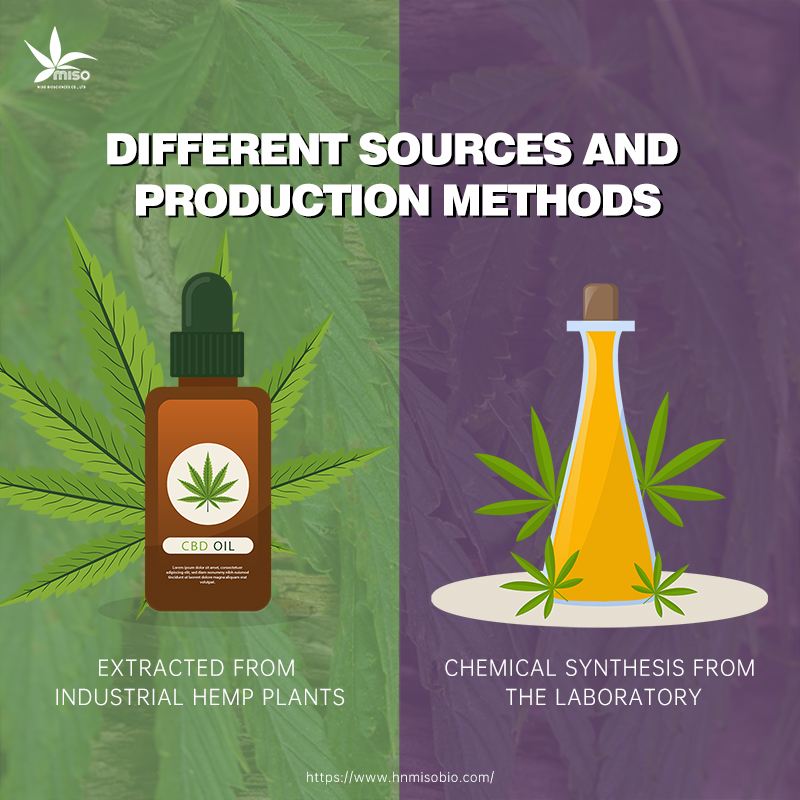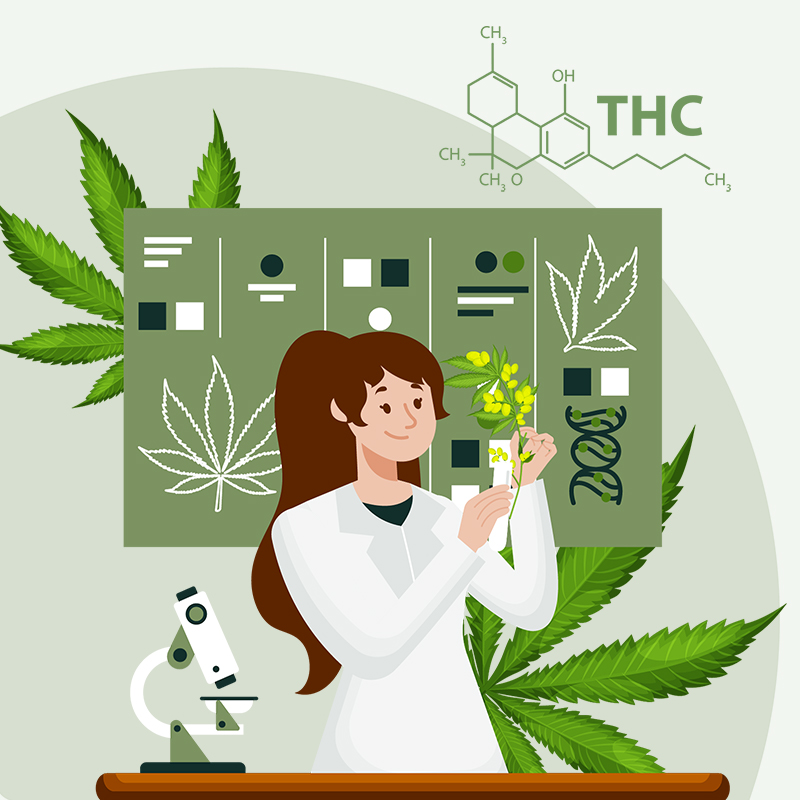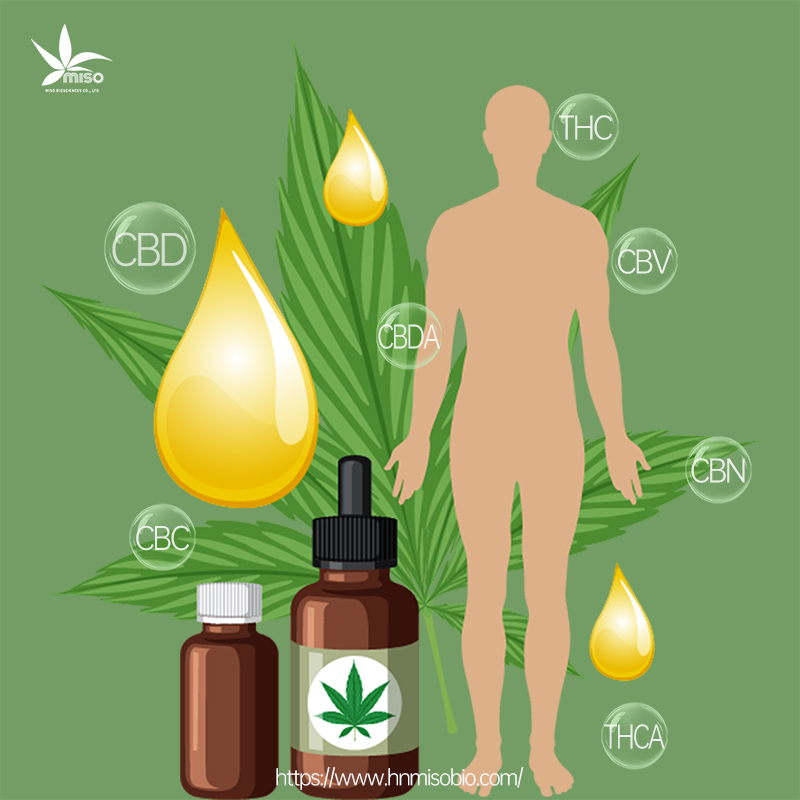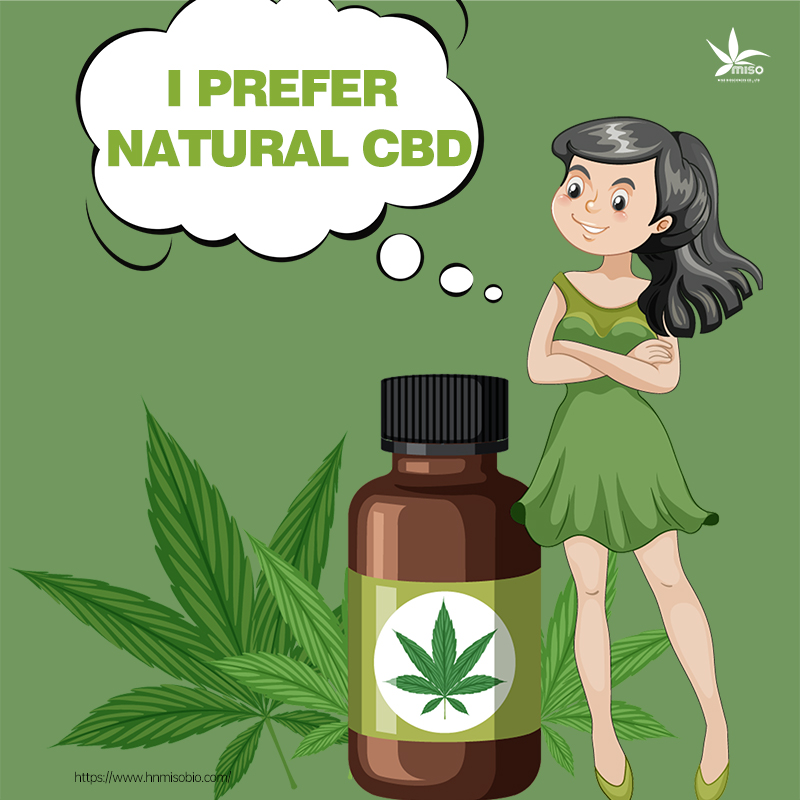CBD (cannabidiol) is a non-psychoactive compound primarily extracted from cannabis plants, such as industrial hemp. In recent years, with the growing popularity of CBD in the global health and wellness sector, people have started to focus on the differences between synthetic CBD and natural CBD. While both share the same molecular structure, there are notable differences in their source, production methods, efficacy, cost, and legal status. Below are some key distinctions between synthetic CBD and natural CBD.
1. Source and Production Methods
- Natural CBD: Natural CBD is extracted from cannabis plants, typically through methods like cold pressing, solvent extraction, or supercritical CO2 extraction, using parts of the industrial hemp plant, such as flowers, leaves, and stems. The extraction process may retain some of the plant's other natural compounds, such as other cannabinoids (e.g., CBG, CBN) and terpenes, which are believed to work synergistically with CBD and enhance its therapeutic effects.

- Synthetic CBD: Synthetic CBD is created through chemical synthesis in laboratories. The molecule is produced by organic chemical reactions, with the final product having the same molecular structure as natural CBD. Synthetic CBD is not derived from cannabis plants and, therefore, does not contain other cannabinoids or plant-based compounds.
2. Molecular Structure and Efficacy
- Molecular Structure: Both natural CBD and synthetic CBD have identical chemical structures. They share the same molecular formula (C21H30O2), which means they are chemically the same. Both interact with the body's endocannabinoid system (e.g., CB1 and CB2 receptors) to produce therapeutic effects.
- Efficacy: Although both natural and synthetic CBD have the same molecular structure, some studies suggest that natural CBD may be more biologically active, particularly when used in combination with other compounds from the cannabis plant (such as terpenes and other cannabinoids), which may produce an "entourage effect" and enhance its efficacy. However, synthetic CBD is generally considered effective for most users, especially when CBD is used on its own.
3. Cost and Production
- Natural CBD: The production cost of natural CBD is typically higher due to the need to extract it from cannabis plants. The extraction and refining processes require advanced equipment and technology and are subject to limitations in terms of hemp cultivation, harvesting, and processing. Additionally, the legality of cannabis plants in different regions can further complicate the production of natural CBD.
- Synthetic CBD: Synthetic CBD is less expensive to produce. Since it does not rely on cannabis plants, the production process is simpler and can be scaled more easily. The manufacturing of synthetic CBD can be carried out in laboratories, and it is not affected by the agricultural aspects of hemp farming, making it more cost-effective for large-scale production.
4. Legality

- Natural CBD: The legality of natural CBD depends on its source. In most countries/regions, CBD extracted from industrial hemp (which contains less than 0.3% THC) is legal. However, if CBD is derived from cannabis plants that contain higher levels of THC, it may be subject to stricter legal restrictions. In many countries, natural CBD derived from industrial hemp is legal, but in certain regions, its legality may be more ambiguous.
- Synthetic CBD: The legality of synthetic CBD is typically clearer because it does not involve cannabis plants themselves. Since synthetic CBD does not contain THC, it may be easier to legalize in countries with stricter laws on cannabis. However, the legal status of synthetic CBD can still vary depending on local regulations.
5. Side Effects and Safety
- Natural CBD: Natural CBD is generally considered safe, with few side effects. It is often preferred for its "full-spectrum" nature, where the plant's other natural compounds work together to enhance the overall therapeutic effects. However, since extraction processes may use solvents or other chemicals, some natural CBD products may contain trace amounts of residuals. Therefore, it is important to select products that are tested and certified by reliable authorities.

- Synthetic CBD: Synthetic CBD is typically pure and does not contain other plant-based compounds. While this means fewer impurities, the long-term safety of synthetic CBD still requires further research. Some users may prefer synthetic CBD for its purity, but the absence of other plant compounds may limit the potential benefits of the entourage effect.
6. Consumer Preferences and Market Demand
- Natural CBD: Some consumers prefer natural CBD because it aligns with the natural health and wellness ethos. Being plant-derived, it is often seen as more eco-friendly and sustainable. Natural CBD products are also marketed for their "entourage effect," in which the combination of CBD with other cannabinoids and terpenes is believed to enhance therapeutic outcomes.

- Synthetic CBD: Synthetic CBD offers the advantage of lower production costs and greater control over the manufacturing process, making it more competitive in price-sensitive markets. However, some consumers may have concerns about the "artificial" nature of synthetic CBD, and those seeking long-term wellness may gravitate toward natural products instead.
7. Market Trends and Future Development
As demand for CBD continues to rise, both natural and synthetic CBD are making their mark in the market. Natural CBD products continue to dominate in the premium segment, while synthetic CBD may be more widely used in mass-market products and specific applications like pharmaceuticals and supplements.
With continued research, scientists are exploring ways to combine the benefits of synthetic and natural CBD. For example, future products may feature synthetic CBD combined with terpenes or other plant-based ingredients to achieve the optimal therapeutic effects, offering new and innovative solutions to consumers.
Conclusion
While natural CBD and synthetic CBD are chemically identical, there are key differences in their production, cost, efficacy, legality, and consumer appeal. Natural CBD is extracted from cannabis plants and may contain other beneficial compounds that contribute to its therapeutic effects, while synthetic CBD is chemically manufactured and offers a cost-effective, scalable production method. When choosing a CBD product, consumers can make their decision based on personal preferences, budget, and the importance they place on natural versus synthetic formulations. As the market matures and technology advances, the combination of synthetic and natural CBD may provide new opportunities for more effective and innovative CBD products.